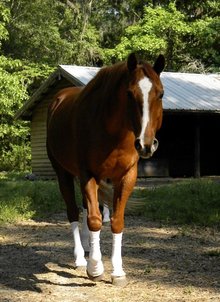According to the American Society for the Protection of Animals (ASPCA): When a horse stomps, it can suggest injury or a medical condition. âHorses can engage in repetitive behavior or produce unusual movements when in pain or as the result of neurological disorders.

Sox for Horses - Helping stomp out the biting fly problem
If horse has no history of stereotypic performance and begins to do things such as head-bobbing, self-biting, foot-stomping or other behaviors that indicate distress, have a veterinarian rule out medical causes.
© 2016 by Sox for Horses
"If horse has no history of stereotypic performance and begins to do things such as head-bobbing, self-biting, foot-stomping or other behaviors that indicate distress, have a veterinarian rule out medical causes.â
In warm weather, the relentless frustration, pain and aggravation driven by flies and biting insects can also lead to stomping and similar behavioral issues. To eliminate the cause, horses need a safe, easy and long-lasting barrier to protect their legs like Silver Whinnys ® by Sox For Horses, Inc.
Leg protection, started early in the season before biting flies become an issue, can deter obsessive stomping, which splits and cracks hooves and can drive shoe nails up through the hoof wall, wasting expensive shoeing work,â says president and founder of Sox For Horses, Inc., Raymond Petterson of Tallahassee, Florida.
âThe key is catching the behavior before it begins, early in the spring, when you're still thinking about the flies coming, not complaining that they're here. As a horse owner, I know from experience that my horses can get in the habit of stomping if their legs aren't protected before the flies arrive. Once the behavior is established they'll stomp even without flies on their legs and it can take a week for them to realize they no longer need to stomp.â
Florida farrier Rob Nichols observed that, once horses start, stomping becomes a habit. He would put fly spray on their legs before beginning his work and, even in the absence of flies, stomping continues.
Aside from Equine Pastern Dermatitis (EPD) issues, Petterson says destruction of hoof wall integrity and/or loosening shoes from constant stomping are two big reasons why owners contact Sox For Horses, Inc. all spring and summer.
âWe know when legs are protected, stomping stops. It may take a few days to a week, depending on the strength of the horse's learned behavior, but they do eventually learn that their legs are no longer being bitten.â
Silver Whinnys ® bring long term value by saving money on trims and shoe sets. The longer horses wear Silver Whinnys ® the more accustomed they become to living bite-free, which reduces frustration and the behavioral need to stomp. Petterson maintains, âWithout concussive abuse, hooves stay well-shaped and free of cracks or splits. Early fly protection averts destructive habitual stomping and saves on money spent for farrier services.â
âAlso, one of the Equine Pastern Dermatitis (EPD) issues we deal with is mud fever or scratches on the rear 'dish' of the pastern. The 'foot' of our Sox are designed to lay over this otherwise hard-to-protect area. Our uniquely-tailored foot design is why our Sox are effective -- from the knees down to the bottom of the foot -- when it comes to protection and prevention.â
Petterson concludes. âSilver Whinnys ® can help owners resolve EPD issues and (so far), weâve not heard of these conditions returning as long as horses continue wearing the socks, which makes them a real value-added tool in fly protection and wound/sore protection.â
And stomp out a bad habit.
